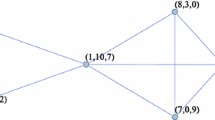Abstract
We propose a new solution concept for generalized Nash equilibrium problems. This concept leads, under suitable assumptions, to unique solutions, which are generalized Nash equilibria and the result of a mathematical procedure modeling the process of finding a compromise. We first compute the favorite strategy for each player, if he could dictate the game, and use the best response on the others’ favorite strategies as starting point. Then, we perform a tracing procedure, where we solve parametrized generalized Nash equilibrium problems, in which the players reduce the weight on the best possible and increase the weight on the current strategies of the others. Finally, we define the limiting points of this tracing procedure as solutions. Under our assumptions, the new concept selects one reasonable out of typically infinitely many generalized Nash equilibria.
Similar content being viewed by others
References
Harker, P.T.: Generalized Nash games and quasi-variational inequalities. Eur. J. Oper. Res. 54, 81–94 (1991)
Facchinei, F., Kanzow, C.: Generalized Nash equilibrium problems. Ann. Oper. Res. 1755, 177–211 (2010)
Dreves, A.: Finding all solutions of affine generalized Nash equilibrium problems with one-dimensional strategy sets. Math. Methods Oper. Res. 80, 139–159 (2014)
Dreves, A.: Computing all solutions of linear generalized Nash equilibrium problems. Math. Methods Oper. Res. 85(2), 207–221 (2017)
Rosen, J.B.: Existence and uniqueness of equilibrium points for concave \(N\)-person games. Econometrica 33, 520–534 (1965)
Harsanyi, J.C.: The tracing procedure: a Bayesian approach to defining a solution for \(n\)-person noncooperative games. Int. J. Game Theory 4, 61–94 (1975)
Harsanyi, J.C.: A solution concept for \(n\)-person noncooperative games. Int. J. Game Theory 5, 211–225 (1976)
Harsanyi, J.C., Selten, R.: A General Theory of Equilibrium Selection in Games. MIT Press, Cambridge (1988)
Nesterov, Y.: Smooth minimization of non-smooth functions. Math. Program. 103, 127–152 (2005)
Facchinei, F., Kanzow, C.: Penalty methods for the solution of generalized Nash equilibrium problems. SIAM J. Optim. 20, 2228–2253 (2010)
Dreves, A.: Uniqueness for quasi-variational inequalities. Set-Valued Var. Anal. 24, 285–297 (2016)
Clarke, F.H.: Optimization and Nonsmooth Analysis. SIAM, Philadelphia (1990)
Facchinei, F., Pang, J.-S.: Finite-Dimensional Variational Inequalities and Complementarity Problems. Springer Series in Operations Research, Springer, New York (2003)
Morgan, J., Scalzo, V.: Variational stability of social equilibria. Int. Game Theory Rev. 10, 17–24 (2008)
Hogan, W.W.: Point-to-set maps in mathematical programming. SIAM Rev. 15, 591–603 (1973)
Dreves, A., Kanzow, C.: Nonsmooth optimization reformulations characterizing all solutions of jointly convex generalized Nash equilibrium problems. Comput. Optim. Appl. 50, 23–48 (2011)
Dreves, A., Kanzow, C., Stein, O.: Nonsmooth optimization reformulations of player convex generalized Nash equilibrium problems. J. Global Optim. 53, 587–614 (2012)
Facchinei, F., Fischer, A., Piccialli, V.: Generalized Nash equilibrium problems and Newton methods. Math. Program. 117, 163–194 (2009)
Dreves, A., Facchinei, F., Kanzow, C., Sagratella, S.: On the solution of the KKT conditions of generalized Nash equilibrium problems. SIAM J. Optim. 21, 1082–1108 (2011)
Nabetani, K., Tseng, P., Fukushima, M.: Parametrized variational inequality approaches to generalized Nash equilibrium problems with shared constraints. Comput. Optim. Appl. 48, 423–452 (2011)
Dreves, A.: Globally Convergent Algorithms for the Solution of Generalized Nash Equilibrium Problems. Dissertation, University of Würzburg (2012), available online at http://opus.bibliothek.uni-wuerzburg.de/volltexte/2012/6982
Krawczyk, J.B., Uryasev, S.: Relaxation algorithms to find Nash equilibria with economic applications. Environ. Model. Assess. 5, 63–73 (2000)
Author information
Authors and Affiliations
Corresponding author
Additional information
Communicated by Vladimir Veliov.
Rights and permissions
About this article
Cite this article
Dreves, A. How to Select a Solution in Generalized Nash Equilibrium Problems. J Optim Theory Appl 178, 973–997 (2018). https://doi.org/10.1007/s10957-018-1327-0
Received:
Accepted:
Published:
Issue Date:
DOI: https://doi.org/10.1007/s10957-018-1327-0
Keywords
- Generalized Nash equilibrium problem
- New solution concept
- Equilibrium selection problem
- Tracing procedure




